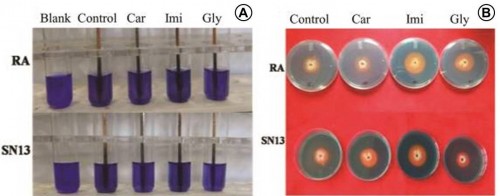Tropical Plant Research
An International Journal by Society for Tropical Plant Research
2017, VOLUME 4 ISSUE 3Pages: 405-418
Pseudomonas putida and Bacillus amyloliquefaciens alleviates the adverse effect of pesticides and poise soil enzymes activities in chickpea (Cicer arietinum L.) rhizosphere
Manoj Kumar, Mohd Aslam Yusuf, Puneet Singh Chauhan, Manisha Nigam and Manoj Kumar*
*Division of Plant Microbe Interactions, CSIR-National Botanical Research Institute, Rana Pratap Marg, Lucknow-226001, Uttar Pradesh, India
Abstract:
Pesticide application for disease management is a major action for crop protection from last seven decades. The repeated application of pesticide is the most important cause of the reduction in microbial population. Soil microorganisms play an important role in efficient acquisition and transportation of nutrients to plant. Pesticides leached in soil disturb the activities of soil enzymes, such as β-glucosidase, dehydrogenase, phosphatases, protease and urease secreted by these microorganisms. This drastically reduces nutrient availability to the plants and soil fertility. In vitro experimental studies revealed that our PGPR (Pseudomonas putida and Bacillus amyloliquefaciens) have the ability to tolerate pesticides at concentrations such as Carbendazim (0.512%), Imidacloprid (3.27%) and Glyphosate (3.27%). We have observed an increase in PGP activities like IAA production, exopolysachchride production, biofilm synthesis, phosphate solubilization and siderophore production on the addition of pesticides at concentrations below there threshold values, on the contrary reduction in activities was noticed above these values. Soil enzymes activities from chickpea rhizosphere without PGPR inoculation showed variability on the application of pesticides whereas activities were found normal or increased with PGPR inoculation and pesticides application. Thus PGPR remains panacea for soils by managing adverse effects of pesticide application. Hence our results concluded that P. putida and B. amyloliquefaciens have the ability to reduce the negative impact of three pesticides and poise soil enzymes activities. Hence our PGPR acts as efficient biofertilizers to improve soil fertility and soil health.

Fig.: Qualitative estimation of in vitro PGP traits in presence of pesticides.
| 0 | 1 | 2 | 5 | 5 | 0 | 4 | 4 |


